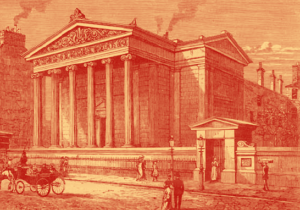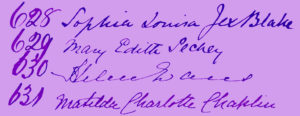A fair field and no favour: a history of the Edinburgh Seven
The Edinburgh Seven were the first group of matriculated undergraduate female students at any British university.

Surgeons’ Hall: the scene of the riot in 1870.
In her essay Medicine as a Profession for Women, published in 1869, Sophia Jex-Blake argued that the only way to determine whether women had the same intellectual ability as men was through ‘a fair field and no favour’ – to ensure that women and men were taught the same, tested the same and if successful, awarded the same degrees as each other.
Origins
The women began studying medicine at the University of Edinburgh in 1869 and although they were ultimately prevented from graduating with a medical degree, the campaign gained national attention and won them many supporters. It put the rights of women to a full and equal university education on the national political agenda. Legislation was eventually passed seven years later to enable women to enter both the medical profession and universities (UK Medical Act 1876).
Although over the four-year campaign some of the original seven left and others joined, the Edinburgh Seven or ‘Septem Contra Edinam’ are considered to be as follows:
• Sophia Jex-Blake
• Isabel Thorne
• Edith Pechey
• Matilda Chaplin
• Helen Evans
• Mary Anderson
• Emily Bovell.
Hope scholarship and riot
After matriculating in October 1869 and commencing their medical studies, the women soon demonstrated that they had both the competence and professionalism required to succeed. In March 1870, Edith Pechey came top in the chemistry exam and was therefore eligible for a Hope Scholarship. The controversy surrounding the decision to award the scholarship to a male student with lower grades rather than to Pechey began to polarise opinion on the presence of women at the University.
On 18 November 1870, the women arrived to sit an anatomy exam at Surgeons’ Hall only to find the gates locked and a large crowd gathered outside subjecting them to considerable physical and verbal abuse. The Surgeons’ Hall riot made national headlines and won the women many new supporters both within Edinburgh and throughout the country. Some of the male students, shocked at the way the women had been treated, began to personally escort the women around campus in order to ensure their safety. However, continued resistance from influential members of the medical faculty eventually persuaded the University to seek recourse to a legal ruling on the presence of women at university.
The court eventually concluded in a majority verdict that the University was not empowered to teach and examine women and therefore had acted illegally in admitting them in 1869. This verdict effectively ended the campaign in Edinburgh.

Graduation ceremony
The ceremony on 6 July posthumously awards the Edinburgh Seven the degrees for which they studied.
By doing so, the University of Edinburgh acknowledges their courage, fortitude and talent.
This ceremony is the first of a series of events which highlights the pioneering spirits and the bravery of the Edinburgh Seven and their supporters.
Their acts opened up a door to a university education which remains open for thousands of students today.



